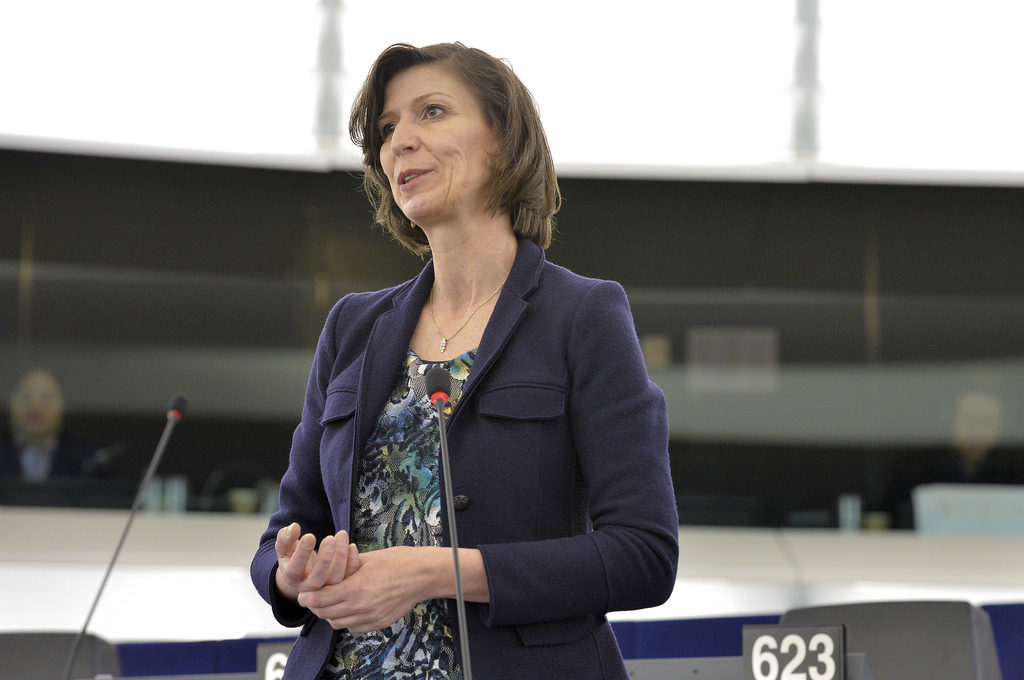Uspjeh Stranke za životinje u europskom parlamentu: opasni pesticidi moraju direktno s tržišta
The European Commission must with immediate effect ensure that hazardous, carcinogenic pesticides will no longer be permitted on the European market and that their use will be prohibited. The Commission was ordered to do so thanks to two proposals of the Party for the Animals in the European Parliament. With this the Party has contributed to a stricter new pesticides act.

Party for the Animals Member of the European Parliament Anja Hazekamp
Research by the food watch dog Foodwatch has recently shown that the European Commission has systematically extended the approval for large numbers of risky pesticides. These extensions were blindly granted without re-evaluating the risks of the substances. This means that European agriculturists and horticulturists are using pesticides which are harmful to people, animals, and the environment.
It was already laid down in the European law in 2015 that five of these pesticides are too dangerous to be used. However, their admission was also extended without being reassessed. Those pesticides are, for example, used for the production of apples, pears, cherries and strawberries, and have been linked to fertility problems and endocrine disruptions with people.
Party for the Animals Member of the European Parliament Anja Hazekamp immediately questioned the European Commission on the result of the Foodwatch research. Last week, she succeeded in enforcing a moratorium on the use of all hazardous pesticides and to stop the automatic extensions of outdated approvals for hazardous pesticides.
Hazekamp: “It is a great victory that the European Parliament finally realises that action should be taken. These substances do not belong in our food. The Commission has the obligation to ensure that only substances are approved which are not harmful to people, animals, and the environment. The European Ombudsman already concluded that the Commission is way too soft, resulting in many substances being on the market while they should not be. This is finally going to end.”
Concerns about animal testing, but no action
Hazekamp has also submitted two proposals concerning the use of animal testing for pesticides. One of those proposals was adopted by the European Parliament: this shows that the parliament is concerned with the fact that the use of animals for testing in respect of hazard identification and risk assessment does not comply with the requirements of the 3 Rs (replacement, reduction and refinement) of the EU Directive 2010/63 concerning animal testing.
However, the parliament’s concerns were obviously not great enough: Hazekamp’s proposal requiring a ban on animal testing in all research and assessment procedures for pesticides was not adopted.
Europska komisija se mora odmah pobrinuti da više nema štetnih, kancerogenih pesticida na europskom tržištu, te da se zabrani i sama upotreba istih. Ovu je zadaću komisija dobila od europskog parlamenta zahvaljujući prijedlozima Stranke za životinje. Time je stranka pridonijela jačim novim zakonima o pesticidima.

Europarlamentarka iz Stranke za životinje Anja Hazekamp
Iz istraživanja Foodwatcha proizlazi činjenica da europska komisija velikom dijelu riskantnih pesticida sistematski stalno produljuje odobrenje za korištenje. Ova su produljenja bila automatska bez reevaluacije mogućih štetnih tvari. To znači da europski seljaci i vrtlari koriste desetak pesticida koji su opasni za čovjeka, životinje i okoliš.
Pet ovih takozvanih pesticida su već 2015. europskim zakonom označeni kao opasni za upotrebu. No, i njihovo je korištenje produljeno bez revidiranja. Ta se sredstva primjerice koriste pri uzgoju jabuka, krušaka, trešanja i jagoda, te se povezuju s neplodnošću i hormonskih poremećajima kod ljudi.
Europarlamentarka iz Stranke za životinje Anja Hazekamp je prema rezultatima istraživanja Foodwatcha direktno postavila pitanja europskoj komisiji. Prošlog je tjedna uspjela otkloniti moratorij za korištenje svih opasnih pesticida i stati na kraj automatskom produljivanju starih odobrenja štetnih pesticida.
Hazekamp: “Odlična je pobjeda da sad i europski parlament uviđa da je potrebno poduzeti nešto. Ovim sredstvima nije mjesto na našim stolovima, u našoj hrani. Komisija ima obavezu da se pobrine da odobri samo one pesticide koji ne štete ljudima, životinjama i okolišu. Europski pravobranitelj zaključio je da je komisija preležerna i da zato toliko pesticida završava na tržištu. Tome će konačno doći kraj.”
Zabrinutost oko testiranja na životinjama, ali nema akcije
Hazekamp je uručila dva prijedloga zakona po pitanju testiranja na životinjama i pesticida. Jedan od prijedloga usvojen je u europskom parlamentu: time parlament izražava svoju zabrinutost oko činjenice da se životinje koriste za testove identifikacije opasnosti i utvrđivanje rizika koji nije u suglasnosti s zahtjevima takozvanih 3 V (zamjena, smanjenje, kupnja) direktive 2010/63/EU o testiranju životinja.
Ali te brige parlamenta očito nisu bile dovoljno važne: Hazekampin prijedlog koji je zahtjevao zabranu testiranja na životinjama u svim istraživanjima i postupcima procjenjivanja za pesticide nije usvojen.